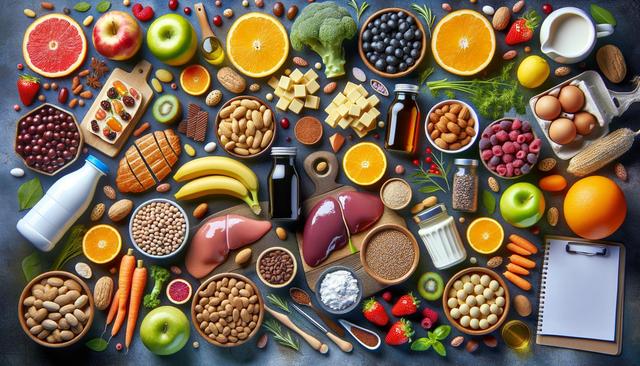Everyday Foods That May Benefit Liver Function
Supporting liver health may start with what you eat daily. Foods like leafy greens, fatty fish, and nuts are rich in nutrients that may aid liver function. Incorporating antioxidant-rich items and staying hydrated can contribute to better liver support naturally.

Leafy Greens and Their Detoxifying Properties
Leafy green vegetables like spinach, kale, and arugula are packed with compounds that may support liver health by promoting detoxification processes. These vegetables are high in chlorophyll, which may help neutralize heavy metals and other toxins in the body. Additionally, their fiber content supports digestion and helps eliminate waste, reducing the burden on the liver. Leafy greens are also rich in antioxidants, particularly vitamins A and C, which may protect liver cells from oxidative stress.
Some notable benefits of leafy greens for liver function include:
- High levels of folate and vitamin K to assist in cellular repair
- Support for bile production, helping the liver process fats
- Anti-inflammatory properties that may reduce liver inflammation
Including a daily serving of raw or cooked greens in meals such as salads, soups, or smoothies is a simple way to assist your liver with natural detox support.
Fatty Fish and Omega-3 Fatty Acids
Fatty fish like salmon, mackerel, and sardines are rich sources of omega-3 fatty acids, which have been shown to play a role in reducing inflammation and fat buildup in the liver. These healthy fats may help regulate enzymes that are involved in fat metabolism, which is essential for those looking to maintain optimal liver function.
Key benefits of consuming fatty fish include:
- Improved liver fat levels, which may reduce the risk of non-alcoholic fatty liver disease (NAFLD)
- Support for anti-inflammatory pathways
- Enhanced insulin sensitivity, which indirectly benefits liver health
Including two servings of fatty fish per week is commonly recommended for those aiming to support liver and cardiovascular health simultaneously. Grilling or baking fish instead of frying also helps avoid adding unhealthy fats to your diet.
Cruciferous Vegetables and Sulfur Compounds
Cruciferous vegetables such as broccoli, cauliflower, Brussels sprouts, and cabbage contain sulfur-containing compounds like glucosinolates. These compounds may activate liver enzymes responsible for detoxifying harmful substances. Additionally, they are rich in fiber, which supports bowel regularity and helps remove toxins through elimination, easing the liver’s workload.
Regular intake of these vegetables may:
- Boost natural detoxification enzyme activity
- Provide antioxidants like sulforaphane that may protect liver cells
- Reduce oxidative stress and inflammation linked to liver strain
Light steaming or stir-frying these vegetables helps retain their nutrients. Including them in meals a few times a week can be an easy and effective way to support overall liver health.
Nuts and Seeds for Liver Support
Nuts and seeds, especially almonds, walnuts, flaxseeds, and chia seeds, are nutrient-dense foods that offer healthy fats, fiber, and antioxidants. These nutrients can play a role in protecting the liver from inflammation and oxidative damage. Walnuts, in particular, are notable for their high content of omega-3 fatty acids and glutathione, a compound involved in detoxification.
Benefits of nuts and seeds for liver function include:
- Reduction in liver enzyme levels that indicate inflammation
- Improved lipid profiles, reducing fat accumulation in the liver
- High levels of vitamin E and polyphenols, known for their antioxidant effects
Moderate portions—about a handful of nuts or a tablespoon of seeds daily—can easily be added to yogurts, salads, or smoothies. However, due to their calorie density, portion control is important, especially for those managing weight.
Hydrating Foods and Beverages
Staying hydrated is essential for liver function, as water helps flush toxins through the kidneys and supports the liver’s natural filtration processes. In addition to drinking water, consuming hydrating foods like cucumbers, watermelon, and citrus fruits can contribute to fluid intake. Herbal teas such as dandelion or milk thistle tea are also commonly used to promote liver support, thanks to compounds that may assist in liver cell regeneration and bile production.
Hydrating foods and beverages may offer the following advantages for liver health:
- Improved toxin elimination through better kidney and liver function
- Antioxidant and anti-inflammatory properties from herbal teas
- Support for digestion and reduced risk of constipation, easing liver workload
Drinking enough fluids daily and including water-rich fruits and vegetables in your meals can be a refreshing and effective way to support liver function naturally.
Conclusion: Small Dietary Choices, Big Impact on Liver Health
Supporting liver function doesn’t require a complex regimen—simple, everyday foods can make a meaningful difference. Incorporating leafy greens, fatty fish, cruciferous vegetables, nuts, seeds, and hydrating options into your diet may provide essential nutrients that help the liver perform its vital roles. These foods bring a range of antioxidants, healthy fats, and fibers that work together to reduce inflammation, assist detoxification, and promote overall liver resilience. Making mindful changes to your daily meals can be a practical and sustainable step towards better liver health over time.